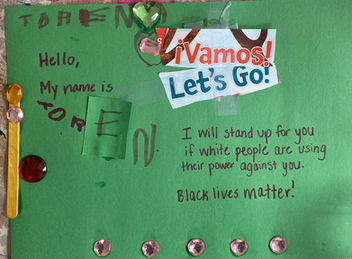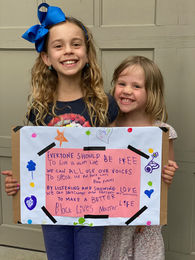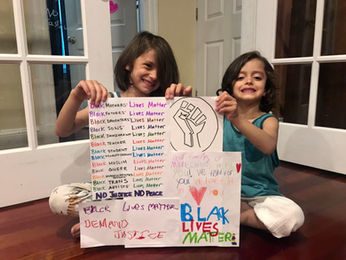
Love Letters 4 Black Lives
On June 28, 2020, Wee The People, the Philly Children’s Movement, Revolutionary Humans by Hold the Line, Center for Art and Community Partnerships, Raising Luminaries, Juxtaposition Arts, and Minneapolis Institute of Art organized Love Letters 4 Black Lives, a Family Day of Action designed to wrap the people of Minneapolis in love while raising funds for Juxtaposition Arts, a Black-led, youth-driven arts center and force for transformation in North Minneapolis.
All day, families created radical love letters in all lengths, shapes, sizes, and forms. Thanks to everyone who helped us reach our $3,000 fundraising goal!
Love Letters 4 Black Lives: Playlist and Reading List
Click here for the full playlist on Spotify
THE SOUNDTRACK to the head and heart work: It's the Love Letters 4 Black Lives playlist! To support and inspire families on our day of action, we paired songs from the playlist with children's books that echo the song's themes.
Song: Brown-eyed Handsome Man
Artist: Nina Simone
Book: My Hair is a Garden
Cozbi Cabrera
Talking point:
We know peanut butter goes with jelly. We know Robin goes with Batman. Some associations are hard-wired in our minds. That's part of the problem with racism: From infancy, negative associations around Blackness are being reinforced all around us. Love letters to Blackness -- in song, in words, in pictures -- are a powerful way to reprogram those hard-wired associations. Black hair become gardens; brown-eyed men become heroes.
Talking point:
There's a reason Frank Ocean's "Pink + White" is on today's playlist. His meandering, blissed-out lyrics speak to the freedom of "being" every Black child deserves -- outside of race struggle and "let my people go" burdens.
Oppression/resilience narratives can limit and distort how we see Black lives. As we nurture antiracism in kids, we HAVE to make room for Black power, Black joy, Black complexity and existence outside of racism.
Song: Pink + White
Artist: Frank Ocean
Book: Octopus Stew
Eric Velasquez
Book: Double Bass Blues
Andrea Loney
Book: Yesterday I Had the Blues
Jerone Ashford Frame
Song: Before I Let Go - Homecoming Live
Artist: Beyoncé
Talking point:
There's an amazing legacy of Black women shattering racial barriers through song. That legacy also represents a double-edge sword, one we can talk about with kids. Beyoncé's iconic performance at the 2018 Coachella Music Festival was hailed as the best live performance of all time by an American musician. Back in 1939 classical singer Marian Anderson also made music history, defying segregation to perform at the Lincoln Memorial. Her concert was also instantly acclaimed; 75,000 people came to hear her, not to mention a radio audience in the millions.
We celebrate these history makers, as we should. But we can also ask: Why must Black people be better than the best for these barriers to be broken? Racism places an extraordinarily unfair burden on Black people that White people don't experience: the burden to be exceptional. Exemplary. Flawless. It's not a big leap from this double standard to the racist narrative that usually emerges from police shootings of Black people. Why did Freddie Gray run? Why did Sandra Bland refuse to put out her cigarette? Why didn't they just do what the police said?
We can absolutely celebrate Anderson and Bey with our kids -- AND we can also encourage them to question and disrupt the double standards that flow from White supremacist ideology.


















